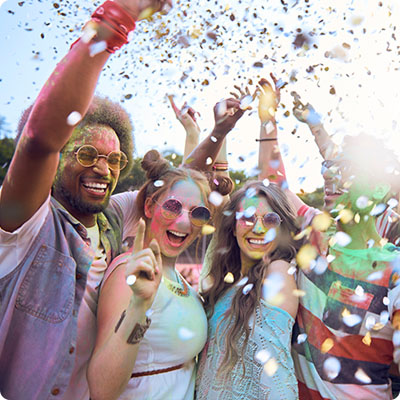
A Sunni Islam
The prophet Mohammed, born in Mecca around 570, had a vision of the archangel Gabriel around 610, and was invested with a capital mission: to preach faith in a single god, Allah. His message is collected in a sacred text, the Koran, which no Muslim can modify. In 622, it is the Hegira: the prophet Mohammed, fleeing hostilities, leaves Mecca to take refuge in Medina, and founds there a society which, little by little, puts Islam in front of the old religious customs, by opposing by all means those who do not approve this new faith. This is the origin of the jihad, the holy war. The authorities in Mecca joined in 630 and, two years later, the prophet Mohammed died.
Islam is governed by five fundamental pillars that Muslims are obliged to practice: the profession of faith, the application of the five daily prayers, the observance of the Ramadan fast, the ritual alms to the poor and defenders of Islam, and finally the Hajj, the pilgrimage to Mecca, which must be performed at least once in one's life. Among these pillars of Islam, one of them gives rhythm to each day: the prayer. The call to prayer is made by the muezzin, from the top of the mosque minaret, at dawn, at noon, at vespers, at sunset and at nightfall, the precise times varying with the seasons. Muslims can pray anywhere, the only rule is to turn towards Mecca during this ritual, after performing the customary ablutions.
Sunnism is the main religious trend in Islam, representing nearly 90% of Muslims worldwide. Its difference with Shi'ism lies in its fidelity to the Sunna, the tradition of the Prophet, and is manifested in a few details: for the Malekite Sunnis, to which Mauritanians belong, man is entirely subject to God (Allah) and there is no clergy, the imam being considered as an official appointed to lead the prayer.
Over the centuries, religious brotherhoods were formed to study Muslim theology, medicine, mathematics, law and other scientific disciplines in depth. These advanced studies are at the origin of the spiritual and intellectual influence of cities like Ouadane, Oualata and especially Chinguetti. The latter, the seventh holy city of Islam, has several libraries containing treasures of manuscripts, remarkably preserved.
The Hegira calendar
The Hegira calendar, followed by Mauritanians for religious holidays, begins on July 16, 622, the date on which the Prophet Muhammad fled from Mecca to Medina. The year 2023 is therefore the year 1444 of the Muslim era. This calendar is based on 12 lunar months, of 29 to 30 days each, while the Christian calendar is based on the movement of the sun. As the beginning of the month is fixed by the naked eye, the dates of religious holidays vary slightly from one country to another, and advance by about ten days each year, compared to the Christian calendar.
Eid-el-Kebir is the most important Muslim holiday in the calendar, the Feast of the Sacrifice or Sheep: it commemorates the sacrifice of Isaac by his father Abraham, in obedience to a divine command. At the last moment, God sends him a sheep to be sacrificed in place of his son and, since then, each family sacrifices a sheep in turn, according to very precise rites. Another essential event is Ramadan, which is celebrated on the 9th month of the Hegira calendar by fasting. Muslims are forbidden to drink, eat and have sexual relations between sunrise and sunset. The whole country then takes another rhythm, waking up at the break of the fast, and celebrating the end of Ramadan with Eid el-Fitr. Finally, the1st Moharram corresponds to the Muslim New Year, the Achouara, tenth day of the year, commemorates the death of the grandson of the Prophet Mohammed, Hussein, and Mouloud the birth of Mohammed.
The religious brotherhoods
The Muslim brotherhoods gather, around a marabout or sheikh, students or talibans. This way of transmitting the baraka (knowledge) is called the silsila. The goal is to allow the students to get closer to the prophet Mohammed and to Allah. If there are four main brotherhoods in Africa (Qadiriya, Tidjaniya, Senoussiya, Mouridism), two of them are especially represented in Mauritania. The Qadiriya, the oldest of the brotherhoods, appeared in Africa in the 15th century. At the beginning of the 20th century, its members facilitated the French penetration of Mauritania in order to protect themselves from the raids of warlike tribes. The second, the Tidjaniya, was founded in the 18th century by an Algerian, Mohammed el-Tidjanî, a former member of the Qadiriya.
Religion or belief?
Officially not very present in Mauritania, animism is a belief whose particularity is to give a soul to all natural phenomena. Animism was the belief of the empire of Ghana, present in Mauritania until the eleventh century, so it is not uncommon to be both Muslim and animist. A Mauritanian may well be a good Muslim by striving to respect the five pillars of Islam, while at the same time going to a fetishist to obtain grigris that will facilitate the success of a project, a union or a business. These traditional beliefs are very present among the Moorish peasants in particular, who do everything possible to improve their living conditions by praying together, to capture vital forces and thus ensure strength, wealth and fertility for the group.
A fragile Christian community
In 2017, the Holy See appointed for the first time an apostolic nuncio in Mauritania, that is, a diplomatic agent of the Holy See, accredited as an ambassador of the pope to the state. People from all continents and from all walks of life gather around the church in Nouakchott, including Christians and foreigners. The country's only diocese, established in 1965, includes the parishes of Nouakchott, Nouadhidou, and the missions of Atar, Rosso, Kaedi, and Zouérate, although they have no faithful. The approximately 4,000 Catholics in Mauritania are all foreigners and come from about 40 different countries, most of them African.











